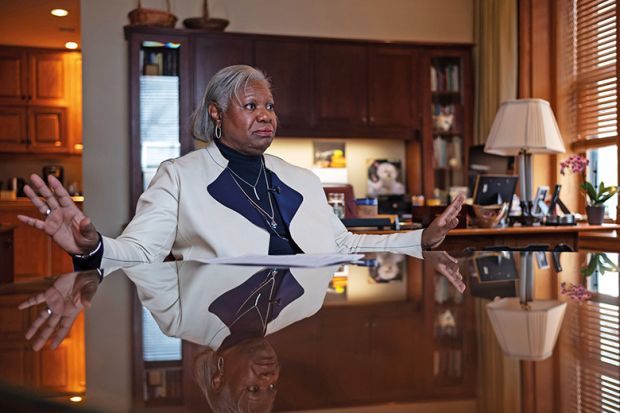Hamline University president Fayneese Miller made a huge error in denouncing an adjunct professor for showing images of the Prophet Muhammad in an art history class. Then she doubled down on her mistake, releasing a letter that simultaneously defended the college for dismissing the professor and denied that it was doing so (“the decision not to offer her another class was made at the unit level”).
But that doesn't mean she should be dismissed, too. Now that Miller has acknowledged her poor decisions, we should give her another chance.
Miller’s actions epitomised the rigid dictates of cancel culture, which requires that offenders be punished swiftly and absolutely. Firing her would reinforce that same ugly trend.
Witness a statement released by Hamline professors calling on Miller to resign. “We are distressed that members of the administration have mishandled the issue and great harm has been done to the reputation of Minnesota’s oldest university,” read the statement, which was signed by 71 of the 92 full-time faculty who attended a meeting about the controversy.
Note the emphasis here upon “harm”, which has become the mark of Cain in our age of cancellation. Anyone who claims harm has suffered it, by definition. And once you blame it on someone else, they’re cooked.
An op-ed in The New York Times suggesting a military response to Black Lives Matter protests? Harm. A column by a history professor that warns against interpreting the past through modern lenses of race and gender? Harm. A book that denounces medical interventions for transgender teenagers? Harm.
And the only remedy is to obliterate the person causing the harm, lest they repeat their misdeeds. You could hear that retributive spirit in the initial email of Hamline vice-president for inclusive excellence David Everett, who denounced the display of images of the Prophet as “undeniably inconsiderate, disrespectful and Islamophobic”. True, Everett admitted, “the intent behind those actions may not have been to cause harm”. But, according to the gospel of cancel culture, intent doesn’t matter. All that counts is the harm itself.
In a follow-up email, Everett and Miller repeated that “it is never our intention to deliberately harm others”. But it happens, anyway, and only our victims can take an accurate measure of it. “This harm is real,” they wrote, “and, when we harm, we should listen rather than debate the merits of or extent of that harm.”
Never mind the harm done to the art history professor, Erika López Prater, who has sued Hamline for religious discrimination and defamation. The university backed off shortly after that. In a joint statement by Miller and the chair of the board of trustees, Hamline admitted that its use of the term “Islamophobic” was “flawed”. It also walked back Miller’s earlier statement that the concerns of offended Muslim students should have “superseded” López Prater’s academic freedom.
But that’s not enough for most Hamline professors, who now want Miller gone. In an interview with a local newspaper, the president of the school’s faculty council cited – you guessed it – “the harm that’s been done”. He also noted the need for “repair”, adding that “new leadership is needed to move that forward”.
Maybe he’s right. But I’d encourage the Hamline faculty to show more solicitude towards Fayneese Miller than she gave to Erika López Prater. They might even forgive her.
Remember forgiveness? It’s another value we seem to have forgotten in our censorious, take-no-prisoners age. It’s a lot easier – and, let’s face it, a lot more fun – to revile our transgressors than to pardon them.
“Cancel culture is pretty much the direct opposite of forgiveness, and I’m afraid we’re becoming so used to the former, we’re forgetting the latter,” columnist Mitch Albom recently observed. “To err is human, but to forgive is dumb, weak, and beneath us.”
But that attitude is weak in its own right. It ignores our ability to grow, and to learn, and to change. It merges sanctimony and sadism: I’m better than you, so I’m going to hate you.
What if Hamline used this moment to demonstrate another way? It might start by declaring – in no uncertain terms – that Miller and other officials messed up, in a very big way. It’s not enough to release a few politely worded statements. Hamline needs to provide a full account of the episode, including all the missteps that occurred.
But, in the same breath, it could also announce that it is retaining Miller. She is not the sum total of her worst decisions, any more than the rest of us are.
That would also strike a more effective blow for free expression than simply sacking her. Miller’s initial attack on López Prater reflected the oft-repeated fallacy that we can’t respect diversity and academic freedom at the same time. Who better to refute that myth than someone who formerly embraced it?
A chastened Miller will be a much more powerful spokesperson for academic freedom than any of the usual suspects, yours truly included. I’ve spent the past decade warning that our efforts to protect students from harmful speech will eventually make honest academic dialogue impossible. I think the Hamline incident shows that I was right, but I’m not at all interested in lording that over Miller. I’d much rather forgive her and let her make the case based on her lived experience. More people will listen to her than to me.
Jonathan Zimmerman teaches education and history at the University of Pennsylvania. He is the author of Whose America: Culture Wars in the Public Schools, which was recently published in a revised 20th-anniversary edition by the University of Chicago Press.
POSTSCRIPT:
Print headline: Academic freedom trumps harm, but forgiveness beats malice
Register to continue
Why register?
- Registration is free and only takes a moment
- Once registered, you can read 3 articles a month
- Sign up for our newsletter
Subscribe
Or subscribe for unlimited access to:
- Unlimited access to news, views, insights & reviews
- Digital editions
- Digital access to THE’s university and college rankings analysis
Already registered or a current subscriber?








